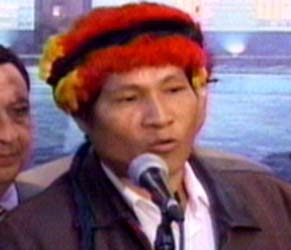Peruvian indigenous leader granted asylum in Nicaragua
 Managua - Exiled Amazon indigenous leader Alberto Pizango arrived in Nicaragua after being allowed to leave Peru to avoid prosecution on charges of inciting violent protests that left 34 people dead.
Managua - Exiled Amazon indigenous leader Alberto Pizango arrived in Nicaragua after being allowed to leave Peru to avoid prosecution on charges of inciting violent protests that left 34 people dead.
Pizango made brief statements to Nicaraguan state-run media saying he lamented the violence, but blamed Peruvian President Alan Garcia and demanded respect for indigenous land and water rights.
"I believe that in the end, the government realized that our struggle is not capricious, but stems from real grievances of the native peoples that are now raising their voices," he said.
After being charged with causing the violence, the 44-year-old school teacher took refuge in the Nicaraguan embassy in Lima and was granted asylum. Garcia agreed to allowed Pizango to leave Peru Wednesday with heavy security and a diplomatic escort to defuse the situation.
"I hope to coordinate international efforts to ensure that the rights of indigenous peoples are respected," Pizango said upon arrival in Managua.
"I think we should all be concerned about what is happening with the native people in my country, because we must all participate in international efforts to avoid a world catastrophe from global warming, and for that we are defending our lands," he said.
The Peruvian government and indigenous communities who have been demonstrating for more than two months over land rights finally started talks aimed at ending the conflict in the Andean country.
Prime Minister Yehude Simon met late Tuesday in Lima with representatives of the Amazonian groups who have been protesting over controversial decrees on foreign investment in the region, which they say impacts their claims on land.
They are demanding the repeal of laws that give foreign investors access to the Amazon's mineral wealth and forests. The laws were enacted without any consultation with indigenous communities.
The talks were made possible after the government decided to revoke the decrees. The final move on the issue was to be made Thursday by Congress.
Simon also said that he would step down as prime minister as soon as the tension is defused, giving into demands of both the native demonstrators Indios and the political opposition.
Given the change in the government's attitude, indigenous leaders asked their supporters to end the blockades on roads, waterways and oilfields that they had kept up for weeks.
For months, Garcia ignored the peaceful protests of the Amazon indigenous. They finally clashed with police on June 5 near the town of Bagua. At least 34 people were killed, including 24 policemen.
The protestors said more of their people were killed when police opened fire at a road blockade. According to Amnesty International, at least 79 indigenous demonstrators were being detained and at least 169 were wounded in the protests.
Garcia earlier said the economic development of the whole country - including the Amazon - is needed to fight widespread poverty. The authorities insisted that the state, which ultimately owns the land in question, will watch out for the interests of the people involved, and also for the environmental equilibrium of the jungle areas at stake.
Garcia signed the decrees after a free-trade agreement between the United States and Peru was inked. (dpa)